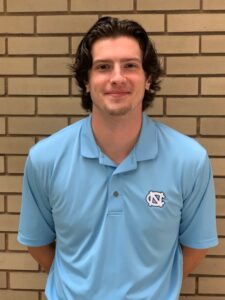By Adelle Schubarg, Environmental Research Assistant
 Joe Salicco is the Outreach Intern for the City of Wilmington’s Lead Hazard Reduction and Healthy Homes Program (LHR/HHP). The program provides lead hazard control, remediation, and abatement services in the homes of eligible homeowners and rental property owners.
Joe Salicco is the Outreach Intern for the City of Wilmington’s Lead Hazard Reduction and Healthy Homes Program (LHR/HHP). The program provides lead hazard control, remediation, and abatement services in the homes of eligible homeowners and rental property owners.
Priority is given to low-income families with young children and, as the Outreach Intern, Joe identifies strategies to communicate with and spread awareness of the LHR/HHP in these communities. This requires intimate knowledge of the local area as well as the program, its rules and standards, and the extent of the services it can offer.
Despite being relatively new to the role, Joe has had the opportunity to take part in many tasks typical of an environmental health professional in the field. He shadowed Robert (R.B.) Gardner, the Coordinator for the LHR/HHP, on home visits and toured building sites undergoing lead remediation.
Joe is a graduate student pursuing a master’s degree in public administration at UNC-Chapel Hill. He recently graduated from UNC-Wilmington with bachelor’s degrees in political science and Spanish, and a minor in nonprofit management and leadership.
Joe has always had a passion for serving others and credits his professors with inspiring him to pursue work in the public sector.
Prior to working with the City of Wilmington, Joe was an intern for Manos Unidas, a program through Black River Health Services that offers health outreach, education, and resources to migrant farm workers in Pender County, NC. He also volunteered at the local food bank in Wilmington, working to increase community awareness and enrollment in the federal government’s Supplemental Assistance and Nutrition Program (SNAP).
Now, Joe aims to work in government and this internship marks the beginning of that pursuit. He appreciates the local scale of his position with the City of Wilmington and says that the most enjoyable part of his job is being able to have such a visible impact on the community. He notes the joy in driving past a home they remediated or running into and speaking with families they helped around town.
It is these everyday interactions that not only showcase the tangible impact his work has on the area but highlights its importance as well.
Joe identifies the quantity of information coming his way as one of the more demanding aspects of his position. He is tasked with the responsibility of communicating accurate and timely information to community members and therefore must be well versed in all facets of the program. As the LHR/HHP is a grant-run program, there is the added challenge of navigating the nuances and stipulations of the grant as well as adhering to its expectations and standards.
To be eligible for the program, applicants must fall within a certain income bracket (80% of average median income or less) and reside within city limits. Due to the nature of these regulations, not every community member seeking assistance is able to receive help from the city’s LHR/HHP.
Joe says that the hardest part of his job is being unable to provide that assistance to families due to the constraints of the grant and only being able to refer them to outside resources.
Despite these constraints, Joe is determined to do all he can to support the local community. He has plans to go door-to-door, establishing connections with residents and raising awareness of the city’s program. In addition, he intends to collaborate with the Wilmington Fire Department, utilizing their local presence and connections to generate an outreach plan for the program.
It is this same model of collaboration that the City of Wilmington finds so useful in the NC Healthy Homes Task Force. Upon formation of the LHR/HHP, the City of Wilmington was made aware of the group and has been an active and participating member ever since. Given the collaborative nature of Joe’s position, he says the task force offers an excellent platform through which to exchange information with other cities and participating entities.
He notes that the task force is a good community with which to brainstorm and exchange ideas, lessons learned, and best practices in the field and is eager to apply these ideas in his own work to continue improving the lives of community members in the City of Wilmington.

